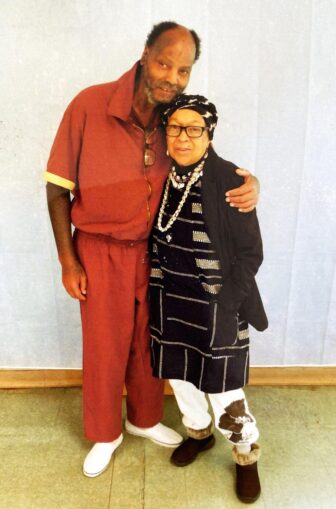
Excerpts from Guerrilla Intellectual University’s interview with Pam Africa, Noel Hanrahan and Ricardo Alvarez on Feb. 12, 2024, by Kalonji Jama Changa and Joy James
Kalonji Changa: [We have on Guerrilla Intellectual University] the founder of the International Concerned Family and Friends of Mumia Abu-Jamal, Pam Africa; Dr. Ricardo Alvarez, physician to Mumia; and the founder of Prison Radio, attorney Noel Hanrahan. Good to have you all [share important information about Mumia Abu-Jamal].
Noel Hanrahan: Mumia Abu Jamal has been in prison now for 42 years. He survived three execution attempts: one on the streets of Philadelphia in 1981 and two literal execution warrants. [It] has been a real struggle for Mumia to communicate with us and to maintain his health. In the last eight years, Mumia has had many health struggles. We as a community have rallied to make sure that Mumia Abu Jamal has survived, just like we rallied when he was under an execution warrant.
He had [severe] hepatitis C, which there was a cure for, [but] the prison was preventing him from getting [the medicine] … [M]obilization literally made sure that Mumia was given that life-saving cure in 2017. Then he had double bypass heart surgery in 2021. He is suffering from a number of medical conditions.
Pam Africa: Mumia has a tendency to not talk about himself when he’s damn near dying. He wanted to talk about other things, but there was no conversation to be had there except his [deteriorating] health. You know what he wants to talk about? He’s doing a new book, “Beneath the Mountain: An Anti-Prison Reader.”
Ricardo Alvarez: I frame any discussion of a medical consultation with Mumia in the context of “What is torture”? A medical consultation with a brilliant public intellectual, a political prisoner … in prison by virtue of what he says, and not what he did … in this context, to do a medical consultation with Mumia in captivity means that there are nuances to words that he says that cue me into concern. One of the words he said, as it relates to the extent of his skin condition, is that it was [is] “unstable.”
[When] Mumia was transferred out of the facility to see an outside cardiologist … he [was] shackled. He asked the prison guards, “Why am I shackled?” They said, “We don’t know. We just know we’re taking you to this place.” He later said to me, “That’s probably their protocol.” He sees this cardiologist, and the cardiologist says to him: “Why are you here?” [and suggests the shackles have increased his distress and health issues].
Medical systems are so broken and stressful for all of the participants in that system. For patients, it’s a hostile system; we literally describe doing community health work as being on the front lines. … The sense of being on the front line [reflects] the mindset of warfare.
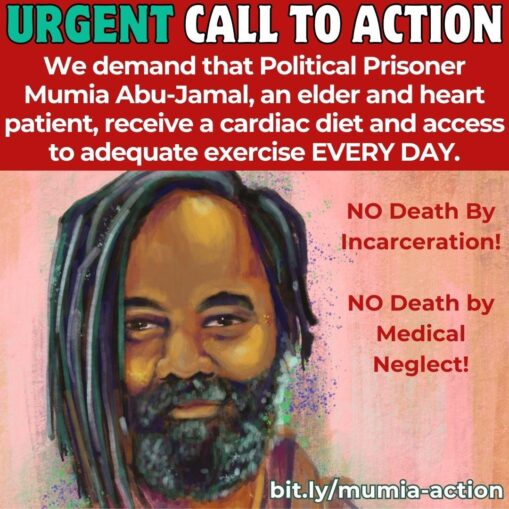
Noel Hanrahan: They delayed Mumia’s [medical] treatment for two years when they had the cure. And that delay increased his risk of having liver cancer, … exacerbated his underlying conditions, including the skin condition, and extra hepatitis. Your skin is an organ. We went to court and got a third circuit injunction for Mumia to get the fast-acting cure for hepatitis C. That was allowed. That was used by other prisoners across the country. It was the first one. Mumia is one person, but we’re advocating for everyone.
Mumia had double bypass surgery in 2021. They [the state and prison] have never provided him outpatient care – care for his diet and exercise, which are the two key ingredients for recovering from cardiac surgery. He has been denied that now for over two years. That means he will [likely] have another cardiac event because they are denying him adequate care.
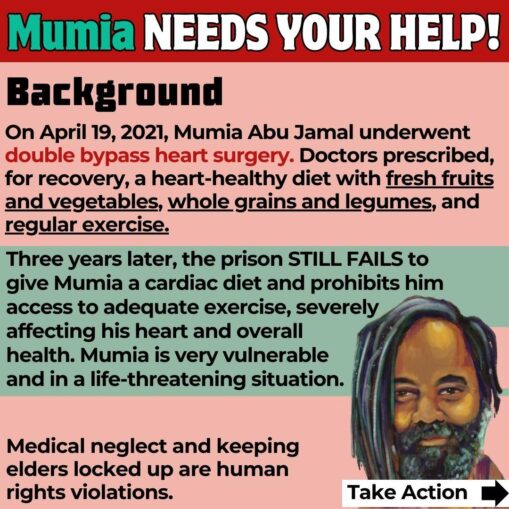
Kalonji Changa: Do you all feel that this is an assassination attempt of Mumia Abu-Jamal? There’s medical neglect … [but] I don’t buy it that Mumia is just the average prisoner.
Pam Africa: No, he is not the average prisoner. And yes, they are definitely, and in front of our faces, attempting to kill Mumia, and all for the blood lust wishes of Maureen Faulkner, Officer Faulkner’s [widow], and the Fraternal Order of Police (FOP). The prison is in cahoots with it. Noel, remind them of the day in court that attorney Bob Boyle came across these papers; and, how we winded up in court dealing with the medical issues. The prison did not do right by Mumia … he filed grievances, and they turned them down.

Ricardo Alvarez: I’ve had challenging medical consultations all my life, but I will say that one of the blessings of being in relationship to such an expansive, spiritual being, is that [Mumia] draws in community: brilliant philosophers, brilliant historians, brilliant lawyers … brilliant humans and activists. Our capacity [is impressive]. I spoke to him about multidisciplinary struggle. Mumia said something to me that I will never forget. . . .: we need to have a memory that this [state violence has] happened before . . . [in order] to connect with the ancestors. We have to recall that there were examples where disciplines work together. We have to remember that the construction, the literal manifestation from its roots, hands, the construction of mass incarceration required multiple disciplines coming together. Architects, planners, medical systems, legal systems, corporate systems – [it] was multidisciplinary [violence] to put it together. We need to have multidisciplinary [efforts to] deconstruct, de-engineer [the prison]. …
[W]e’re doing the work done by Laura Whitehorn [and] RAPP [Release Aging People from Prison] and others. The released elders have been a huge and powerful voice. There is a clear call: “Liberate our elders; this is institutional elder abuse.”
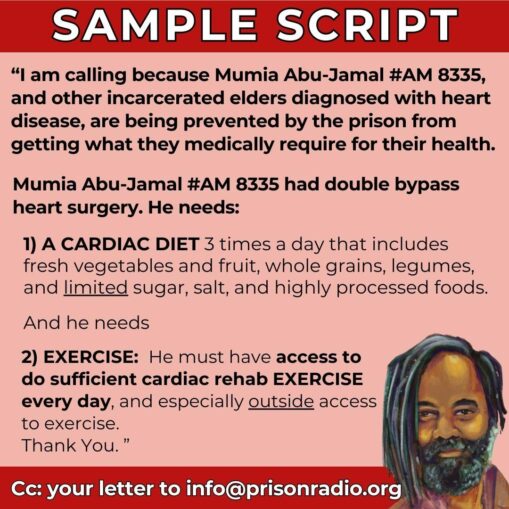
Noel Hanrahan: There is a sea change now in our multidisciplinary, professional society to report elder abuse, if we can come together in a coordinated way, multidisciplinary unity, for mass incarceration abolition. If we can get a Mumia coalition together, and go to our professional societies and hold them accountable, then we can address the identified social determinants of health, specifically, the FOP [Fraternal Order of Police], in Mumia’s case, and address the harms of unqualified immunity, right, or qualified immunity, that gives them permission. We can address those harms of the code of silence. We can identify corporations, an individual, Citizens United, and begin that process of doing a diagnostic analysis of their pathology and bring that out into the public in concrete ways. Then we begin to create a coalition where we correctly put the culprit, the FOP, on trial. That’s what I believe to be the next stage of [struggle].
Our strategies are to keep Mumia alive, in transition to freedom immediately. If we can do that effectively, including the emerging ethical community, biomedical ethical community, [with] … consensus around abolitionist public health, working communication with the American Public Health Association, the AMA [American Medical Association]. All of these institutions are filled with contradictions. No one is perfect here. Abolition is a humbling journey. But if we can begin that conversation in defense of our communities, I believe we will turn the tide, in effect, and honor the call to liberate our elders. And when we bring them back into our community, in a loving way, then they give us counsel on how to reverse engineer. …
Joy James: Thank you all for your courage and your consistency. … [What you describe] reminds me of COINTELPRO. There are different ways to eliminate people. …

[H]ow do you see the strategy of resistance … “war resistance” and “assassination resistance” when so much violence is obviously secreted. Prison is a fortress of pain, intimidation and death. You have to be able to get inside to get the narrative [and] … bring it out. What would you like us to do in terms of mobilization and organizing on an international level? People across the globe support Mumia. … What roles should we play in the effort to stop medical assassinations and harm within prison and [beyond those walls]? [Pluto Press launches State Crime Journal with articles on Mumia Abu-Jamal and Palestine in London in March].
Ricardo Alvarez: One of [Mumia’s] lessons that helps [to] expand an understanding of “Love Not Phear” is compassion. There is no monolithic medical prison community, we have to appreciate. … When Mumia was hospitalized and we mobilized around the four-point shackling when he shared that trauma. Imagine being in four-point shackles, and unable to scratch yourself. This beautiful, brilliant, peaceful man [has helped us to] create a language and an understanding of where you can have the trauma … it was difficult for him to communicate … [this] can be happening in settings with compassionate medical personnel who are competent. I asked him: [Who] do you trust? What is your energetic? How do you feel?” [Despite the violent trauma,] Mumia describes people who can be loving and caring.
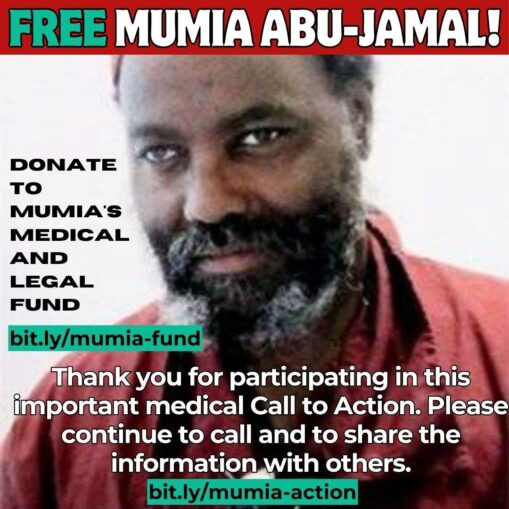
There is care within prison settings and outside; … [there are] competent, caring people who can operate in oppressive systems and do a good job. But there is a deep failure for the professional community. The medical community [has to] acknowledge the underlying oppressive violence that our community, our brothers, our sisters, our loved ones are suffering. The social determinants of health [include] … poverty, homelessness … violence. It is specifically state violence that is so important.
When we look at medical assassination, there is medical complicity at the highest levels within these oppressive systems. Was that high blood sugar just missed? Quite possibly. Does that happen in outpatient settings? Absolutely. We’re not saying that someone necessarily deliberately [failed to diagnose]. But … where there is objective evidence of an effort to assassinate, it is important that we all voice that. … [S]tate violence is so gross, so deliberate, that we need to be able to stand from a place of defense of our community.
Advocate and author Joy James’s recent books include: “In Pursuit of Revolutionary Love,” “New Bones Abolition: Captive Maternal Agency and the (After)Life of Erica Garner,” “Contextualizing Angela Davis.” With articles and interviews developed with Kalonji Changa, James edited the forthcoming “Beyond Cop Cities: Dismantling Corporate-Funded Armies,” from which the excerpt is taken. Joy can be reached at jjames@williams.edu.
Kalonji Changa is founder of the FTP-Movement and of RSTV and Black Power Media. He is the author of “How to Build a People’s Army” and co-producer of the documentary “Organizing Is the New Cool.” Celebrating their 20th anniversary, the FTP Movement has launched with Common Notions Press their 2024 political education series: “The Culture of Resistance.” Kalonji can be reached at defendingthepoor@gmail.com.
Source: SF Bayview